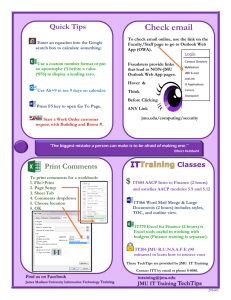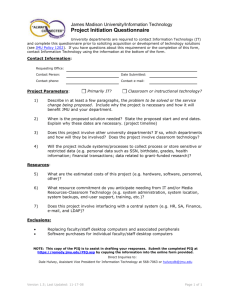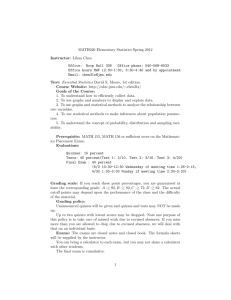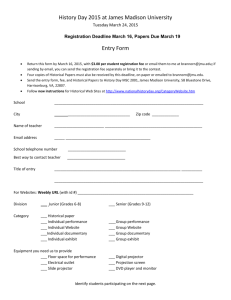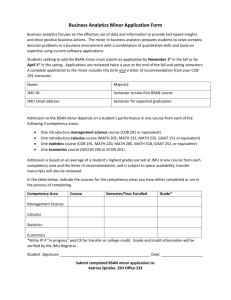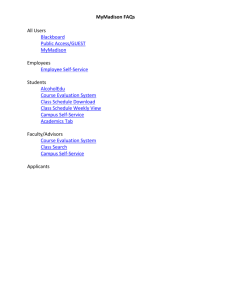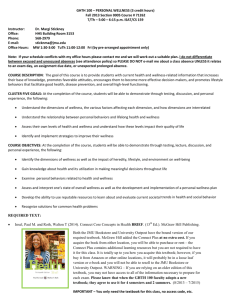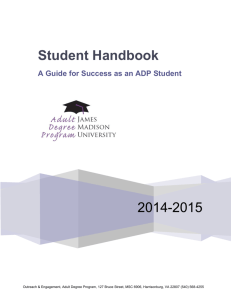1 Dr. Ehsan Ahmed Spring 2013 Econ 432: Advanced
advertisement
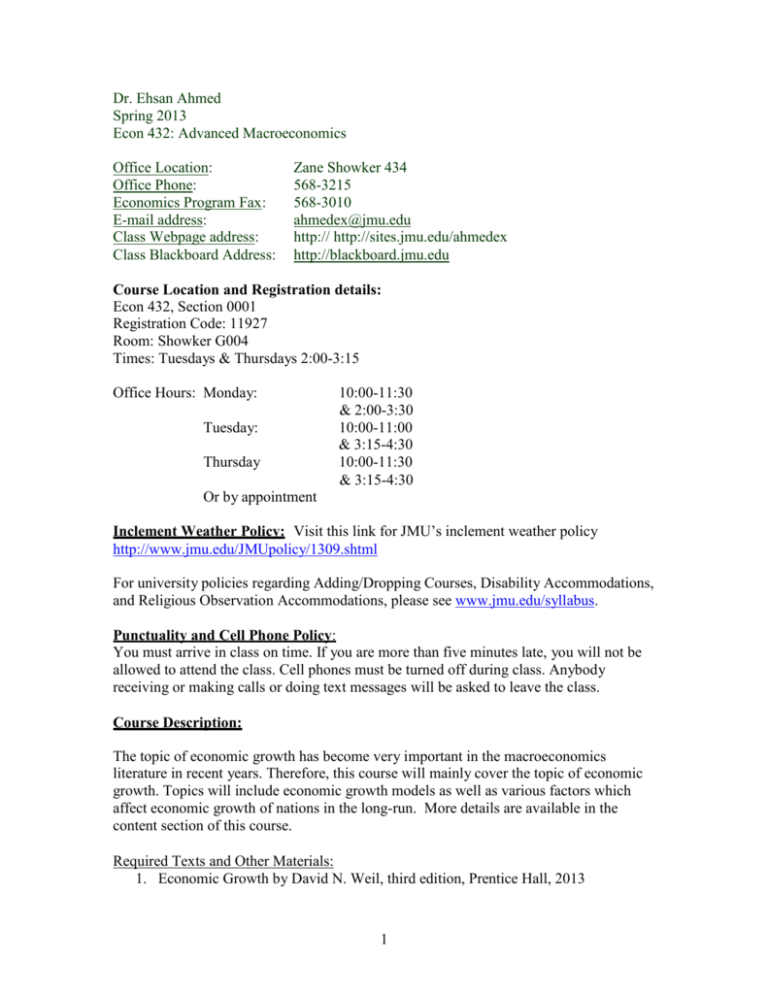
Dr. Ehsan Ahmed Spring 2013 Econ 432: Advanced Macroeconomics Office Location: Office Phone: Economics Program Fax: E-mail address: Class Webpage address: Class Blackboard Address: Zane Showker 434 568-3215 568-3010 ahmedex@jmu.edu http:// http://sites.jmu.edu/ahmedex http://blackboard.jmu.edu Course Location and Registration details: Econ 432, Section 0001 Registration Code: 11927 Room: Showker G004 Times: Tuesdays & Thursdays 2:00-3:15 Office Hours: Monday: Tuesday: Thursday 10:00-11:30 & 2:00-3:30 10:00-11:00 & 3:15-4:30 10:00-11:30 & 3:15-4:30 Or by appointment Inclement Weather Policy: Visit this link for JMU’s inclement weather policy http://www.jmu.edu/JMUpolicy/1309.shtml For university policies regarding Adding/Dropping Courses, Disability Accommodations, and Religious Observation Accommodations, please see www.jmu.edu/syllabus. Punctuality and Cell Phone Policy: You must arrive in class on time. If you are more than five minutes late, you will not be allowed to attend the class. Cell phones must be turned off during class. Anybody receiving or making calls or doing text messages will be asked to leave the class. Course Description: The topic of economic growth has become very important in the macroeconomics literature in recent years. Therefore, this course will mainly cover the topic of economic growth. Topics will include economic growth models as well as various factors which affect economic growth of nations in the long-run. More details are available in the content section of this course. Required Texts and Other Materials: 1. Economic Growth by David N. Weil, third edition, Prentice Hall, 2013 1 2. Why Nations Fail: The Origins of Power, Prosperity, and Poverty by Daron Acemoglu and James Robinson, available at Amazon.com in hardcopy and Kindle editions. Also available at ibooks. 3. Selected articles related to the topic of economic growth are posted in the document section of the Blackboard site for this course. Performance Expectations: 1. Every student must review the assigned material prior to every class. 2. All written assignments (if any) must be turned in on designated deadlines. No credit will be given if the written assignment is not turned on time. If you do not plan to attend the session in which a written assignment is due, it is your responsibility to turn in the assignment. Assignments not turned in by the designated date will not be entered in my roll book for credit, irrespective of the circumstances. 3. Each exam date will be announced in advance. Exam dates are not negotiable. You must take your exams on the designated dates. Make prior arrangements if you have a conflict with a designated exam date. Failure to take an exam on the designated date without prior arrangements will result in an “F” grade for that exam. Deadlines for written assignment and exam dates will be announced in class at least one week prior to the due date. The first exam will be in mid February. The second exam will be in late March and the final exam will be held according to the university schedule. 4. All announcements, latest information about the course and assignments will be posted on http://blackboard.jmu.edu . You are expected to visit the Webpage for this class regularly. You can e-mail or phone me if you have any questions and problems. Make sure you keep your JMU e-mail account active throughout the semester. Use of e-mail for communication is strongly encouraged in this class. I may frequently communicate with you by using your JMU e-mail account. Students are required to use appropriate library and/or Internet resources for any homework assignments, which require research or data collection. 5. Class participation in various discussions is strongly encouraged. Grades: The final grade is based on three in-class exams and one research paper. The grades will (Approximately) be based on the following weights: 1. 2. 3. Three in-class tests including the final. Each test will carry 100 points. These exams will carry total of 300 points. Final exam schedule for spring 2013 is located at http://www.jmu.edu/registrar/wm_library/1131_exam_schedule.pdf One position (analytical) paper based on “Why Nations Fail” book mentioned above. The paper must be around 10 pages and will carry 100 points. More detailed instructions for the paper and deadlines will be provided very early in the semester. Up to 10 points may be earned by having an excellent attendance record. Periodic random attendance will be taken and students can earn up to 5 points 2 by signing those attendance sheets. A record of all attendance sheets will be kept. These points will be used as extra credit. Guidelines for research paper: 1. Deadline for submitting you completed draft is Thursday, April 18, 2013. 2. Missing the deadline for the paper will cost you 10% of the grade per day. The deadline for the paper is set in advance to give to plenty of time to complete this project. There will be no extensions given for the paper. If you have difficulty meeting the deadline due to some problem, keep in mind that you are not supposed to wait until the deadline to finish the work. My suggestion is to start your work early. Please do not ask me for any extensions and be prepared to lose 10% per day if you do not meet the deadline given below. If your paper is delayed by 10 days, you get "0". 3. Your paper must be based on the analytical review of the Why Nations Fail: The Origins of Power, Prosperity, and Poverty by Daron Acemoglu and James Robinson. Just writing a summary of the book is not sufficient. You must analyze the major contents of the book. You may take a specific position about the book but it must be based on critical analysis. The text of your paper must be around 10 double-spaced pages. Bibliography or reference pages may be extra. You must follow the proper rules of research, which means including references and complete bibliography. You can use the format used by the American Economic Review or the Journal of Economic Literature. Internet references (available on the bottom of the webpage) are not acceptable. 4. You can use other published work to support your analysis but it must be properly referenced. Use of articles published in economics journals is highly recommended. You may also use articles from magazines like the Economist or the newspapers like Wall Street Journal with proper references. Academic Integrity: JMU policy on research is paraphrased below: Making references to the work of others strengthens your own work by granting you greater authority and by showing that you are part of a discussion located within an intellectual community. When you make references to the ideas of others, it is essential to provide proper attribution and citation. Failing to do so is considered academically dishonest, as is copying or paraphrasing someone else’s work. The consequences of such behavior will lead to consequences ranging from failure on an assignment to failure in the course to dismissal from the university. 3 You must strictly adhere to the JMU Honor Code. Some examples of Honor code violation in this class are: 1. Copying someone else's paper. Seeking help from others to do you research paper. 2. Acquiring or purchasing articles written by someone else. 3. Using someone's work without proper citation. Course Contents: (Solution notes and derivations for Weil’s technical notes are available on Blackboard in PDF format. You must print those and have them with those before each class) Section 1: Economic Growth Part 1: Overview 1. Economic growth facts and Framework: Weil’s Chapters 1, 2 Part 2: Factor Accumulation 1. Physical Capital 2. Population and Economic Growth 3. Future Population Trends 4. Human Capital Chapter 3 Chapter 4 Chapter 5 Chapter 6 Part 3: Productivity 1. Measuring Productivity 2. The Role of Technology in Economic Growth 3. The Cutting Edge of Technology 4. Efficiency 5. Growth in open economy Chapter 7 Chapter 8 Chapter 9 Chapter 10 Chapter 11 Part 4: Fundamentals 1. Government 2. Income Inequality 3. Culture 4. Geography, Climate and Natural Resources 5. Resources and the Environment at the Global Level 4 Chapter 12 Chapter 13 Chapter 14 Chapter 15 Chapter 16

